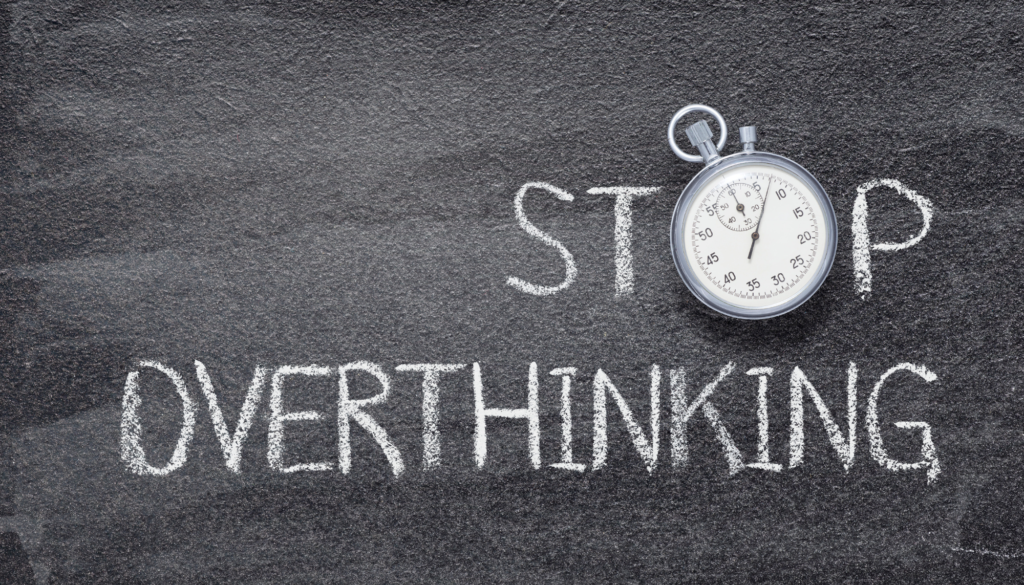
Overthinking: A Modern Era Nightmare
Life is complex. Yes, only if you take whole bunch of problems at a time. We keep thinking about issues and problems all day long. A minor family problem or an un-finished task in the office keeps us awake whole night. No one of us is spared of this problem. It is a nightmare of modern age. Everyone is in hurry. This new era problem called overthinking caused due to excessive, unproductive dwelling on thoughts. Thoughts are often negative, repetitive, or focused on things outside our control. It badly affects our physical and mental health and steals our joy and interest in life.
The life we are living-in had never been the same ever. In the modern world, things are moving very fast. Information is bombarded from different corners. We get involved in the issues which are not directly related to us. We get involved and un-necessarily it creates anxiety. We start thinking about the problem and its solutions. We look for a quick solution. Sooner a few problems are sorted out, ten new one pop-up. We put ourselves in a loop of no escape. At this point, it becomes very important to silence our mind and reclaim our mental peace.
Here we will discuss the common causes of overthinking, we will talk about actionable, proven strategies on how to stop overthinking and finally break the overthinking cycle. Let’s start our journey to transform from a prisoner of our thoughts to the master of our mind.
Causes of Overthinking in brief
Before finding the solution for the problem, we should understand and recognise the origin of the problem. To effectively stop overthinking, we must first understand its root cause. Obviously, overthinking has no single origin; there are many factors which make the problem complicated. A human life has various factors, which work together to give our life a meaning. One or more such factor may trigger overthinking. Among these factors some may be psychological or environmental.

Human Brain and its Primitive Blueprint
No doubt, nature has given us an amazing brain which is coded with all possibilities for survival. For millions of years, our ancestors survived on vigilance to detect threats and analyse potential dangers. Our brain has not changed much and it is still equipped with the same “threat detection system”. Overthinking can often be an overactive manifestation of this primal instinct, where our brains are constantly scanning for problems, real or imaginary.
If we analyze our brain, the prefrontal cortex, responsible for logical thinking, planning, and decision-making, can become overwhelmed when emotional input is excessively strong. Instead of calmly processing information, it gets caught in a loop of endless analysis, fuelled by perceived threats or anxieties.
Psychological and Emotional factors for triggering overthinking
Most powerful reason for our overthinking lies within our psychological and emotional makeup. Uncertainty has always been a part of human life. It causes anxiety and fear of the unknown which is the core cause of overthinking. It leads to a vicious cycle, anxiety fuels the need to over analysing every detail, hoping to gain control or predict outcomes. It does not stop here; fear extends to various aspects of our life like fear of failure, fear of rejection, fear of making the wrong decision. Fear of uncertainty is the most profound reason of anxiety. We try to mentally solve the problems of future when we don’t know much about it. These all become the reason of our discomfort.
Un-avoidable factors of the modern world also contribute to overthinking. Introduction of internet in our life has elevated the level of perfection too high. The artisans, sellers, technicians who were competing locally are now exposed to the whole world. At one side where it has given an opportunity to grow on the other side it made the competition very tough. Everyone is not having the resources to grow to the national or international level. Here every task, every conversation, every decision must be “just right”. This leads to endless analysis, re-analysis, and tweaking; ensuring nothing is ever truly finished or good enough. Perfectionism and overthinking are often two sides of the same coin, leading to chronic dissatisfaction.
Life is full of ups and downs. In our life journey we commit some mistakes. Sometimes they become life turning, either in positive or negative way. For many, a mistake of past becomes life hack. They keep on thinking about the same problem and slowly that becomes a part of their thought process. This overthinking doesn’t let them grow, plan and take action for future.
A lack of confidence in one’s abilities, judgments or worthiness can lead to excessive questioning. This self-doubt fuels the need for constant mental checking. It is very common thought that “Overthinking about a problem will give a solution”. Rather it escalates the problem and the person gets struck in a loop of overthinking and could not decide what to do.
Influence of modern world on our behaviour and environment
Our brain processes unlimited data every second. Most of the data come from present and past experiences. In processing this data, our daily habits and the world around us also play a significant role. There are number of embedded factors which play their role in overthinking.
We are living in an age of information overload. Consistent bombardment of news, social media feeds, emails and unlimited access to visual data don’t let us focus on our goal. It leads to mental clutter and overthinking. This information overflow also affects our decision making ability. There always remains a fear of making the wrong choice, which leads to decision paralysis and overthinking.
Lack of ability of handling odd situations also leads to overthinking. Instead of addressing the underlying issue, the mind gets caught in a loop of repetitive thoughts. As we are surrounded by social media feeds, such odd situations are very common. Fuelled by curated social media feeds, the tendency to compare ourselves to others is at an all-time high. This constant comparison can lead to insecurities, self-doubt, and endless rumination about our perceived shortcomings or how others might perceive us.

Overthinking and Its Impacts on our Life
As we discussed earlier, overthinking has disastrous effect on our life. It affects our physical as well as mental health. Our personal and professional life gets affected. It has its role in our relationship, productivity and wellbeing.
Overthinking leads to anxiety and stress. It creates a constant state of alert, keeping your mind in a perpetual fight-or-flight mode. This chronic mental stress elevates cortisol levels, leaving you feeling constantly wired, tense, and exhausted. Constant rumination on negative thoughts or past events can lead to feelings of hopelessness, sadness, and even clinical depression. The inability to break free from these thought patterns can create a sense of being trapped. Your brain works overtime, constantly analysing, predicting, and rehearsing. This relentless activity drains your mental energy, leading to significant fatigue. We become incapable of experiencing the present moment. Simple pleasures go unnoticed.
How our body reacts to overthinking
The mind and body are intrinsically linked. Overthinking affects us physically and leads to various physical problems.
Overthinking leads to sleep disorder. It contributes to insomnia, restless sleep, and frequent awakenings, further exacerbating mental fatigue and affecting overall health. Lack of sleep affects our productivity and happiness. Digestive issues are another big problem due to overthinking. It leads to irritable bowel syndrome (IBS), stomach upsets, nausea, and other digestive problems. Our immune system also faces the effects of overthinking leading us to more susceptible to illnesses. Chronic tension in the neck, shoulders, and head are common physical symptoms of mental stress.
When we fall in the trap of overthinking, the fear of making the wrong choice keeps us stuck, unable to move forward on tasks. The goals, or even simple daily decisions are delayed. This leads to chronic procrastination, where tasks pile up, increasing stress and further fuelling the cycle of overthinking. When your mind is caught in a rigid loop, it loses its flexibility and capacity for creative solutions. It can lead to missed opportunities in both personal and professional life.
How our relationship gets affected
When our mind overthinks, it loses its focus. At a time it is thinking on too many issues. It results in poor communication. We might withdraw, misunderstand intentions, or become overly defensive. This situation can erode trust, leading to suspicion and complicate the connections. Fear of judgment and over-analyzing social interactions can lead to increased social anxiety, causing individuals to avoid social situations altogether.
These are the symptoms of overthinking that collectively diminish our quality of life. Recognizing their profound impact is the first step toward seeking a path to freedom..

How to Stop Overthinking and Reclaim Your Mind
After recognizing the problem of overthinking, we should start working on the solution fast. Overthinking is a habit. Like any habit, it can be unlearned and replaced with healthier patterns. We will discuss here some of the solutions to break the overthinking cycle and foster a calmer, more productive mind.
Recognizing the problem
First step towards overcoming overthinking is to recognizing the problem. When we recognise the problem, we also recognize the situations, emotions, or thoughts typically send us spiralling into overthinking. Keep a mental note or, even better, a journal. Writing down the issues causing overthinking is a practical way of solving the problem. You can identify recurring themes, irrational fears, and patterns of thinking that lead to overthinking. Simply emptying your mind onto paper can provide immense relief.
Practice noticing your thoughts without judgment. When you catch yourself overthinking, simply say “Ah, there’s overthinking again” without criticizing yourself. This detaches you from the thought and creates space for a different response. This simple act is foundational for mindfulness for overthinking.
Breaking the overthinking loop
We can adapt some simple methods to overcome the problem of overthinking:
- The “Five-Minute Rule”: If a worry or decision is consuming you, give yourself a strict five-minute timer to worry about it intensely. Write down every single thought. When the timer goes off, consciously redirect your attention to something else. This validates the thought but puts a boundary on it. It looks simple but it will take some time to master it. Patience will be required.
- Scheduled Worry Time: Similar to the five-minute rule, dedicate a specific 15-30 minute slot each day for all your worries. If a worry pops up earlier, mentally “park” it for your scheduled worry time. This teaches your brain that worries have a designated slot and don’t need constant attention.
- Distraction Techniques: When you feel the overthinking loop starting, immediately engage in an activity that fully occupies your mind. This isn’t about avoiding issues, but about breaking the immediate thought pattern.
- Physical activity: Go for a walk, do push-ups, dance.
- Engage your senses: Listen to music, cook, take a hot shower.
- Mind-absorbing tasks: Read a gripping book, do a puzzle, call a friend and focus entirely on the conversation.
- “Stop!” Command/Thought Stopping: This is a simple but effective technique for managing intrusive thoughts. When you catch yourself overthinking, mentally or even verbally, if alone, shout “STOP!” Then, immediately redirect your thoughts to something else or engage in a mindful activity. It is a very effective way of breaking the overthinking loop.
- Challenge Your Thoughts: Your thoughts are not always facts. Learn to question them:
- Is it true? Am I basing this thought on solid evidence or just assumptions, fears, or speculation?
- Is it helpful? Does dwelling on this thought serve me or hinder me? Is it leading to a solution or just more anxiety?
- What’s the worst-case scenario? And if that happened, how would I cope? Often, the worst-case is not as catastrophic as we imagine, and we would be more resilient than we think.
- What’s the best-case scenario?
- What’s the most realistic scenario? This rational perspective often brings you back to a balanced view.
Long-Term solutions for overthinking
As we have discussed some short and tactical steps to counter overthinking, sometimes things go beyond short-term solutions. Here we will discuss some practical and permanent solutions for overcoming overthinking.
Mindfulness teaches:
- Basic Mindfulness Practices: Start with just 5-10 minutes a day. Focus on your breath, noticing the sensation of air entering and leaving your body. When your mind wanders, gently bring it back to your breath.
- Body Scan Meditation: Lie down and systematically bring your awareness to different parts of your body, noticing any sensations without judgment.
- Take help of meditation apps: Numerous apps and online resources offer guided meditations specifically for anxiety and overthinking. You can always take help of these apps.
- Accept Imperfection: Shift your mindset from rigid perfectionism to “good enough.” Understand that progress is always better than paralysis. The fear of making a mistake often leads to no action at all. Remind yourself that mistakes are learning opportunities, not reflections of your worth.
- Take action, don’t over analyse: Taking simple step ahead is always better than over analysing the situation. Instead of getting bogged down in endless analysis, choose the next logical small step and execute it. This is a key principle for breaking the cycle of overthinking.
- Set Boundaries with Information: Consciously limit your exposure to news, social media, and other digital inputs, especially before bed. Create “digital detox” periods. Excessive information can fuel anxiety and provide more support for overthinking.
- Practice Self-Love: Be kind to yourself when you catch yourself overthinking. Instead of self-criticism, acknowledge the difficulty and remind yourself that you are human. Treat yourself with the same understanding and patience you would offer a friend.
- Build a Strong Support System: Talk to trusted friends, family members, or mentors about what you’re experiencing. Sometimes, simply verbalizing your worries can diminish their power. Others can offer fresh perspectives or simply listen without judgment.
- Prioritize Sleep, Nutrition, and Exercise: These are the foundational elements of good mental health. A well-rested, well-nourished, and physically active body is much better equipped to manage stress and prevent the mind from spiraling into overthinking.
Conclusion
At MotivateAura.com, our mission is to empower you to live your best life. Overthinking is a common challenge. It is within our reach to find a complete solution. If we focus and realise the issue and diligently applying the actionable strategies we have discussed – from mindful awareness and tactical interruptions to cultivating long-term mental resilience – you can absolutely transform your relationship with your thoughts.
Your journey to mental freedom begins with a single step. Embrace the process, be patient with yourself, and celebrate every small victory. You are capable of cultivating a calm, clear mind that allows you to engage fully with life, make empowered decisions, and experience genuine peace.
What is your biggest challenge when it comes to overthinking? Share your experiences and insights in the comments below. Let’s learn and grow together!

